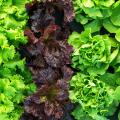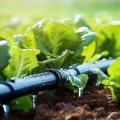Cabbage
Cabbage

Cabbage can be green or red, smooth or curly (savoy), and have flat or pointed heads.
Cabbage is grown exactly as described for broccoli in both spring and fall. When purchasing cabbage plants in spring, beware of large plants or those with stems as large as a pencil. Bundled, bare-root transplants with large, woody stems may flower without forming a head.
When growing transplants, select varieties that mature over several weeks to extend the harvest season from a single planting. Also, purchased transplants of a non-hybrid (open-pollinated) variety mature over several weeks. Use starter solution when setting transplants in the garden.
As cabbage matures, head-splitting results from the pressure of water taken up by the plants after the heads are solid. Soft heads indicate lack of maturity.
Serious insect problems for cabbage are aphids and cabbage worms. The major diseases, black leg and black rot, are seed-borne and difficult to control except by purchasing disease-free seeds and plants.
Varieties
- Red Head—hybrid; main season; red; 85 days; AAS 1971.
- Rio Verde—hybrid; heads slightly flattened; strong blue-green; main season late; 85 days.
- Round Dutch—open-pollinated; old, popular garden variety; most commonly sold as transplants; main season; round, green head; tolerant to cold weather; resistant to bolting; 75 days.
- Ruby Ball—hybrid; very deep red; solid, round head; 5 to 6 inches across; 70 days; AAS 1972.
- Savoy Ace—hybrid; savoy heads of deep green; round; 78 days; AAS 1977.
Publications
News
Tomatoes are a popular crop, both for commercial growers and home gardeners. Even the best tomato growers run into problems along the way! We put together a simple, easy-to-follow guide to help you spot a few of the most common tomato troubles gardeners see.
Did you know lettuce was one of the first vegetables brought to America by Christopher Columbus? What a great fun fact!
If there’s one thing that’s important in gardening, it’s proper watering. Vegetable gardens need about 1 inch of water each week.




